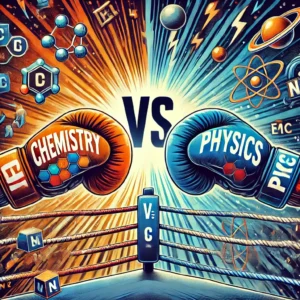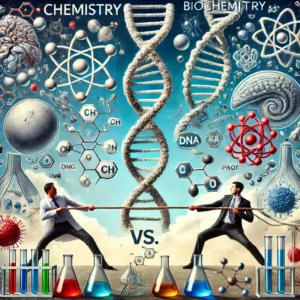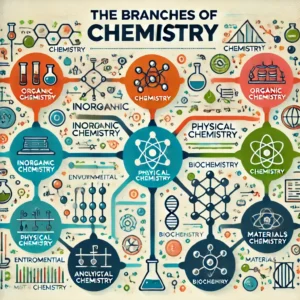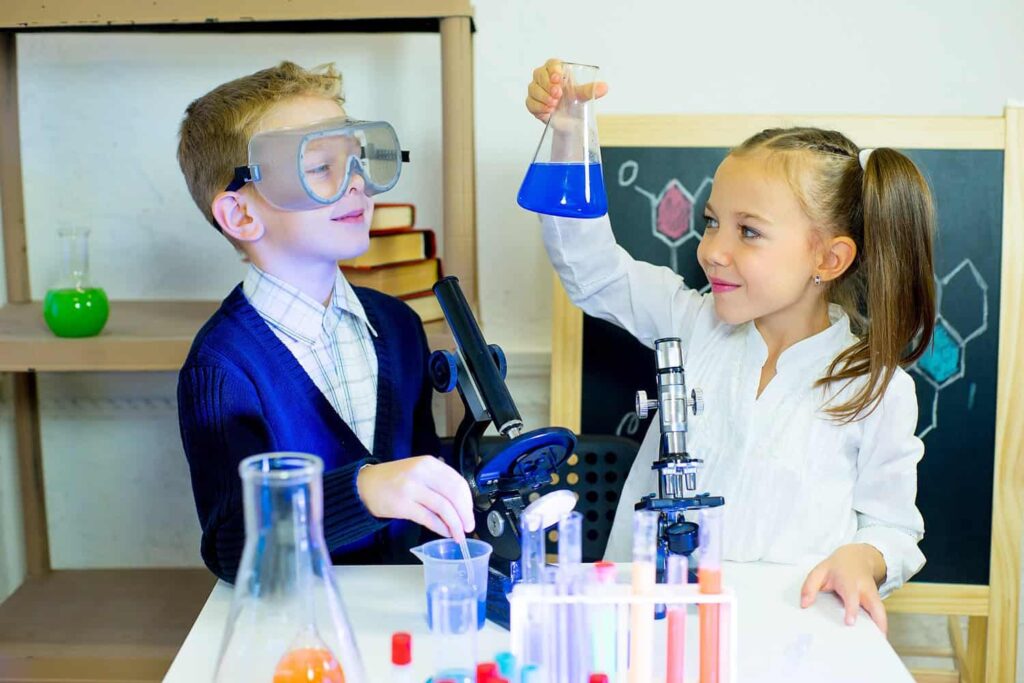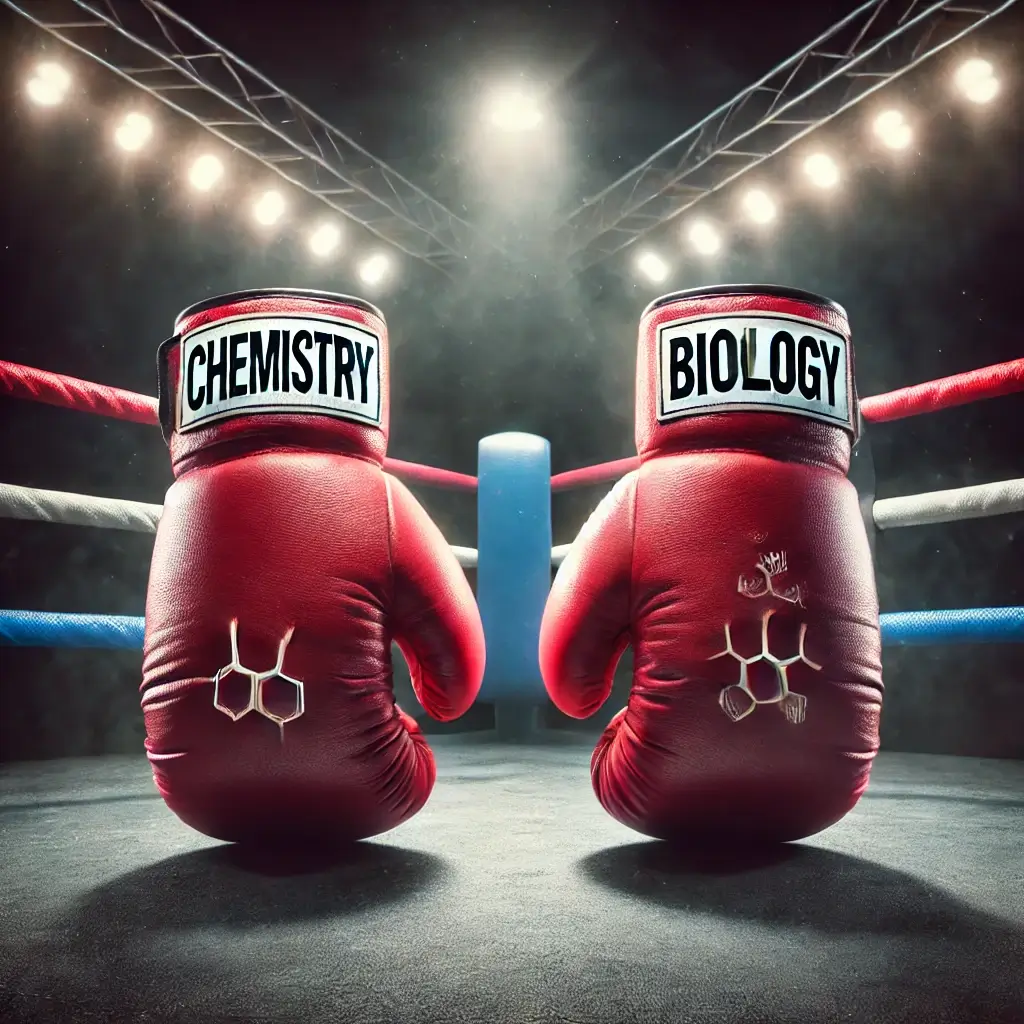
Chemistry and biology are two essential branches of science that study the natural world, each with its own unique approach. Chemistry focuses on the composition, structure, and interactions of matter at the atomic and molecular levels, while biology explores living organisms, their functions, and how they interact with their environment. Despite their differences, these fields are deeply interconnected, with chemistry providing the molecular foundation for biological processes.
If you’re trying to decide which discipline to pursue, here’s a quick comparison to help you make an informed choice about your career path.
- Main Differences Between Chemistry and Biology
- Main Similarities Between Chemistry and Biology
- Which Is More Important: Chemistry or Biology?
- Which Is Harder: Chemistry or Biology?
- Can I Study Both Chemistry and Biology?
- Educational Path for Studying Chemistry vs Biology
- Skills You Need to Study Chemistry vs Biology
- Examples of Real-Life Applications of Chemistry vs Biology
- Careers in Chemistry vs Biology
- World View of Chemists vs Biologists
- Can Chemistry Exist Without Biology Or Vice Versa?
Main Differences Between Chemistry and Biology
| Aspect | Chemistry | Biology |
|---|---|---|
| Focus | The study of matter, its properties, composition, and reactions. | The study of living organisms, their structure, functions, and interactions. |
| Scope | Primarily concerned with chemical reactions, molecular interactions, and the properties of substances. | Concerned with life processes, genetics, evolution, and ecosystems. |
| Approach | Experimental, involving the study of substances and how they change. | Observational and experimental, focusing on understanding living organisms and their behaviors. |
| Methods | Uses laboratory experiments to observe chemical reactions and analyze substances. | Uses experiments, field studies, and observations to study living organisms and their interactions. |
| Tools | Laboratory instruments such as spectrometers, chromatography, and chemical synthesis equipment. | Microscopes, DNA sequencers, ecological monitoring tools, and imaging technology. |
| Nature of Study | Focused on understanding how different elements and compounds interact at an atomic and molecular level. | Focused on understanding the structure, function, and evolution of living organisms. |
| Relationship to Other Sciences | Closely linked to biology, medicine, and material science. | Closely linked to chemistry, medicine, and environmental science. |
Main Similarities Between Chemistry and Biology
| Aspect | Chemistry | Biology |
|---|---|---|
| Fundamental Science | Both are fundamental sciences that explain natural processes. | Both are fundamental sciences that explain natural processes. |
| Molecular Basis | Studies atoms and molecules that form substances and drive chemical reactions. | Studies molecules like DNA, proteins, and enzymes that drive biological functions. |
| Interconnected | Chemistry is essential for understanding biological processes at a molecular level. | Biology depends on chemistry to explain cellular processes and metabolism. |
| Experimentation | Relies on controlled laboratory experiments to analyze chemical reactions. | Uses laboratory experiments and field studies to understand life processes. |
| Energy Transformations | Examines energy changes in chemical reactions (e.g., exothermic and endothermic reactions). | Studies how organisms use and convert energy (e.g., photosynthesis, respiration). |
| Scientific Method | Uses observations, hypotheses, experiments, and analysis to draw conclusions. | Uses observations, hypotheses, experiments, and analysis to draw conclusions. |
| Understanding Life and Nature | Helps explain how substances interact and change in natural and artificial environments. | Explains how living organisms function and interact with their environment. |
| Applications in Medicine | Essential in drug development, biochemistry, and medical research. | Critical for understanding diseases, genetics, and physiology. |
| Interdisciplinary Research | Overlaps with biology in fields like biochemistry and pharmacology. | Overlaps with chemistry in fields like molecular biology and biotechnology. |
How Chemistry and Biology Are Related
Chemistry and biology are deeply interconnected because life itself is built on chemical principles. While chemistry focuses on the composition and behavior of matter, biology applies these principles to living organisms. Here’s how they connect:
- Molecular Basis of Life: Biology relies on chemistry to explain the molecules that make up living organisms, such as DNA, proteins, carbohydrates, and lipids. The chemical structure of these molecules determines their function in biological systems.
- Biochemical Reactions: Every biological process, from digestion to photosynthesis, involves chemical reactions. Enzymes, which are biological catalysts, speed up these reactions, allowing life to function efficiently.
- Cellular Processes: The way cells generate energy (such as through cellular respiration) depends on chemical principles like oxidation and electron transfer. Similarly, processes like protein synthesis and DNA replication are guided by chemical interactions.
- Metabolism and Energy Flow: Chemistry explains how organisms obtain and use energy. For example, ATP (adenosine triphosphate) is the energy currency of cells, and its production follows chemical pathways like glycolysis and the Krebs cycle.
- Medicinal Chemistry: Biology and chemistry work together in medicine and pharmacology. Understanding the chemical structure of drugs helps scientists develop treatments that interact effectively with biological molecules.
- Environmental Science: Chemistry helps biologists understand the impact of chemicals on ecosystems, such as pollution, nutrient cycles, and biochemical interactions in the environment.
- Overlapping Fields: Several scientific disciplines combine both subjects, such as biochemistry (which studies the chemical processes within living organisms) and molecular biology (which focuses on how biological molecules interact at a chemical level).
In short, chemistry provides the foundation for understanding life at a molecular level, while biology applies these principles to explain how living organisms function and interact with their environment. Together, they help us make sense of everything from genetics to medicine to ecosystems!
Which Is More Important: Chemistry or Biology?
The question of whether chemistry or biology is more important depends on the context. Both sciences are vital, and their significance varies based on the field of study or real-world application. Here’s why each is essential in its own way:
Importance of Chemistry:
- Foundation of Life: Chemistry provides the molecular basis for biological functions. It explains how atoms bond to form the molecules that make up living organisms, including DNA, proteins, and lipids.
- Medicine and Healthcare: Many medical advancements, such as drug development, vaccines, and diagnostic tests, rely on chemistry. Understanding chemical interactions helps create life-saving treatments.
- Food and Nutrition: Chemistry helps us understand how food is broken down in the body, how nutrients are absorbed, and even how flavors and preservatives work in food production.
- Environmental Impact: Chemistry plays a major role in addressing environmental issues like pollution control, climate change, and the development of sustainable materials.
- Industrial and Technological Advances: Chemistry is essential for manufacturing materials such as plastics, pharmaceuticals, and household products.
Importance of Biology:
- Understanding Life: Biology helps us understand the structure and function of living organisms, from microscopic bacteria to complex ecosystems. It explains how life evolves and adapts.
- Healthcare and Medicine: Biology provides the foundation for medical sciences, from understanding diseases to developing treatments and improving human health through genetics and biotechnology.
- Ecology and Conservation: Biology helps us study ecosystems, biodiversity, and conservation efforts to protect species and habitats from environmental threats.
- Agriculture and Food Production: Biology plays a key role in food production, from genetic engineering of crops to understanding plant and animal health.
- Human Body and Physiology: Biology helps us understand how our bodies function, how cells work, and how organs interact to keep us alive and healthy.
The Verdict:
Neither chemistry nor biology is more important—they are deeply interconnected. Chemistry explains the molecular mechanisms behind biological processes, while biology applies these principles to living organisms. If you want to study life at a molecular level, chemistry is crucial. If you want to understand living organisms and their interactions, biology is essential.
Ultimately, both sciences work together to improve our understanding of the natural world, medicine, technology, and the environment.
Which Is Harder: Chemistry or Biology?
The difficulty of chemistry versus biology depends on a person’s learning style, strengths, and interests. Both subjects present unique challenges, and some students may find one easier than the other based on their skills and preferences. Here’s how they compare:
Challenges in Chemistry:
- Memorization and Understanding: Chemistry requires memorizing elements, chemical reactions, molecular structures, and formulas. However, it’s not just about memorization—understanding reaction mechanisms and atomic behavior is crucial.
- Mathematical Component: Unlike biology, chemistry involves calculations related to stoichiometry, thermodynamics, and kinetics. Some students find the math in chemistry challenging.
- Abstract Concepts: Concepts like electron configurations, molecular bonding, and reaction rates can be difficult to visualize and grasp.
- Lab Work: Chemistry requires precise laboratory skills, working with chemicals, and following detailed procedures to achieve accurate results.
Challenges in Biology:
- Heavy Memorization: Biology involves extensive memorization, including cell structures, biological processes, taxonomies, and genetics. Some students struggle with the sheer amount of information.
- Concept Complexity: While biology isn’t as math-heavy as chemistry, it requires an understanding of complex processes like DNA replication, photosynthesis, and the human immune system.
- Detail-Oriented Study: Biology often requires remembering minute details about how living organisms function and interact, which can feel overwhelming.
- Less Predictability: Unlike chemistry, where reactions follow predictable patterns, biology can be more variable due to the complexity of living systems.
The Verdict:
Both chemistry and biology can be challenging, but in different ways:
- If you prefer logic, problem-solving, and applying formulas, you may find chemistry more manageable.
- If you’re good at memorization and understanding systems in a broad, conceptual way, biology may feel easier.
- If you struggle with math, chemistry might seem harder. If you find memorizing large amounts of information difficult, biology might be more challenging.
Ultimately, the difficulty of either subject depends on your strengths, interests, and how you approach learning. Both sciences are fascinating and essential to understanding the natural world!
Can I Study Both Chemistry and Biology?
Absolutely! Studying both chemistry and biology is not only possible but also highly beneficial. Many scientific fields rely on knowledge from both disciplines, and understanding their connections can open up a wide range of career opportunities.
Why Study Both Chemistry and Biology?
- Interdisciplinary Knowledge: Many scientific fields, such as biochemistry, molecular biology, and pharmacology, blend chemistry and biology. Having expertise in both subjects makes you more versatile.
- Real-World Applications: Chemistry helps explain biological processes at a molecular level, such as how enzymes function, how medicines work, and how cells generate energy.
- Deeper Understanding of Life Sciences: Biology tells us how life functions, and chemistry explains the reactions and molecules that drive those functions. Studying both provides a well-rounded perspective.
- Broad Skill Set: Chemistry develops analytical and problem-solving skills, while biology enhances understanding of complex systems and living organisms.
Career Opportunities:
Studying both chemistry and biology can lead to careers in:
- Biochemistry: Researching the chemical processes within living organisms.
- Pharmaceutical Science: Developing and testing new drugs.
- Biomedical Science: Working in medical research and healthcare.
- Environmental Science: Studying the impact of chemicals on ecosystems.
- Genetic Engineering: Modifying genes to improve health and agriculture.
Challenges of Studying Both:
- Practical Work: Both subjects involve laboratory experiments, requiring careful attention to detail and strong analytical skills.
- Heavy Course Load: Both subjects require a lot of memorization, lab work, and problem-solving. Balancing both can be demanding.
- Conceptual Overlap: While they complement each other, chemistry and biology approach problems differently. Chemistry focuses on reactions and molecular structures, while biology is more system-based.
Educational Path for Studying Chemistry vs Biology
Here’s a quick overview of the educational paths for chemistry and biology, including dual or interdisciplinary options at different academic levels.
| Education Level | Chemistry | Biology | Dual or Interdisciplinary Options |
|---|---|---|---|
| High School | General chemistry, AP/IB chemistry (optional), basic math | General biology, AP/IB biology (optional), introductory anatomy/genetics | Take both chemistry and biology, focus on lab skills and critical thinking |
| Undergraduate (B.S.) | B.S. in Chemistry: inorganic, organic, physical, analytical chemistry | B.S. in Biology: genetics, microbiology, cell biology, ecology | Dual major in chemistry and biology, or a combined degree (e.g., Biochemistry, Molecular Biology) |
| Graduate (M.S.) | M.S. in Chemistry: specialize in areas like medicinal chemistry, biochemistry, or environmental chemistry | M.S. in Biology: specialize in areas like biotechnology, genetics, or ecology | Joint master’s program in biochemistry, molecular biology, or bioengineering |
| Graduate (Ph.D.) | Ph.D. in Chemistry: research in organic, inorganic, or physical chemistry | Ph.D. in Biology: research in molecular biology, genetics, neuroscience | Ph.D. in Biochemistry, Biophysics, or Molecular Biology |
| Postdoctoral | Research in specialized chemistry fields (e.g., drug development, nanotechnology) | Research in specialized biology fields (e.g., genetics, immunology) | Postdoctoral research in interdisciplinary fields like biomedical sciences or synthetic biology |
| Career Opportunities | Chemist, pharmaceutical scientist, materials scientist, environmental chemist | Biologist, geneticist, microbiologist, ecologist, healthcare researcher | Roles in biotechnology, bioengineering, pharmaceuticals, forensic science, academic research |
Skills You Need to Study Chemistry vs Biology
Both chemistry and biology require a solid foundation in scientific thinking, problem-solving, and data analysis. However, chemistry emphasizes mathematical calculations, reaction mechanisms, and lab techniques, while biology requires strong memorization skills, an understanding of living systems, and the ability to analyze complex biological interactions.
| Skill Type | Skills for Chemistry | Skills for Biology |
|---|---|---|
| Mathematical Skills | – Basic algebra, stoichiometry, and thermodynamics calculations. | – Basic statistics and probability for analyzing biological data. |
| Problem-Solving Skills | – Breaking down chemical reactions and solving equations. | – Applying biological concepts to real-world problems (e.g., genetics, medicine). |
| Analytical Skills | – Interpreting experimental data using spectroscopy and chromatography. | – Analyzing genetic sequences, ecological trends, or lab results. |
| Attention to Detail | – Precise chemical measurements and reaction monitoring. | – Careful observation of biological specimens and experimental conditions. |
| Experimental Skills | – Handling chemicals, titration, and synthesis techniques. | – Conducting dissections, microbial culturing, and field studies. |
| Conceptual Understanding | – Atomic structure, bonding, reaction mechanisms. | – Evolution, cellular biology, genetics, and physiology. |
| Communication Skills | – Writing lab reports and presenting chemical research. | – Explaining biological processes and documenting research findings. |
| Computational Skills | – Using chemical modeling software (e.g., ChemDraw, MATLAB). | – Analyzing genetic data and using bioinformatics tools. |
While both fields require strong analytical and communication skills, chemistry is more lab- and reaction-focused, whereas biology emphasizes the study of living organisms, requiring extensive memorization and fieldwork.
Examples of Real-Life Applications of Chemistry vs Biology
Chemistry and biology play crucial roles in everyday life, from medicine to environmental conservation. While chemistry focuses on molecular interactions and reactions, biology applies these principles to living systems, ecosystems, and health sciences.
| Field | Real-Life Applications of Chemistry | Real-Life Applications of Biology |
|---|---|---|
| Medicine & Healthcare | – Drug formulation and synthesis (e.g., antibiotics, vaccines). | – Understanding disease mechanisms and immune system functions. |
| – Chemical analysis in diagnostic tests (e.g., blood tests, pH levels). | – Medical research on genetics and treatments (e.g., gene therapy). | |
| Energy & Environment | – Chemical processes in renewable energy (e.g., biofuels, hydrogen cells). | – Conservation biology and impact of pollution on ecosystems. |
| – Water purification and air pollution control. | – Sustainable agriculture and biodiversity protection. | |
| Food & Agriculture | – Food preservation, additives, and flavor chemistry. – Fertilizers, pesticides, and soil chemistry. | – Understanding plant genetics and breeding techniques. – Microbiology in fermentation, food safety, and probiotics. |
| Materials & Engineering | – Development of plastics, polymers, and nanomaterials. | – Biomaterials in medical implants and tissue engineering. |
| – Chemical reactions in textile dyeing and waterproof coatings. | – Study of biodegradable materials and ecological impact. | |
| Cosmetics & Personal Care | – Formulation of skincare and beauty products (e.g., sunscreens, hair dyes). | – Impact of skin microbiome on dermatology and product effectiveness. |
| – Development of biodegradable and eco-friendly cosmetics. | – Natural ingredient sourcing and testing for biological safety. | |
| Forensic Science | – Chemical analysis of evidence (e.g., drug testing, toxicology). | – DNA fingerprinting and genetic profiling in criminal investigations. |
| Space Exploration | – Study of extraterrestrial soil and atmospheric chemistry. | – Search for microbial life and impact of space on living organisms. |
Verdict:
Both chemistry and biology contribute significantly to advancing science, medicine, and sustainability. Chemistry provides the tools to understand molecular interactions, while biology applies these principles to living organisms and ecosystems.
Careers in Chemistry vs Biology
Here’s a comparison of careers in chemistry and biology, along with potential interdisciplinary options:
| Field | Careers in Chemistry | Careers in Biology | Interdisciplinary Careers |
|---|---|---|---|
| Healthcare & Medicine | – Pharmacist – Medicinal Chemist – Toxicologist – Biochemist | – Doctor (Physician) – Geneticist – Microbiologist – Biomedical Scientist | – Biochemist – Molecular Biologist – Biotechnology Researcher |
| Energy & Environment | – Environmental Chemist – Analytical Chemist – Water Quality Scientist | – Ecologist – Conservation Biologist – Marine Biologist | – Environmental Scientist – Climate Change Researcher – Biofuels Scientist |
| Food & Agriculture | – Food Chemist – Agricultural Chemist – Flavor Chemist | – Agricultural Scientist – Plant Biologist – Nutritionist | – Food Safety Scientist – Agricultural Biochemist – Crop Scientist |
| Materials & Engineering | – Polymer Chemist – Nanotechnologist – Chemical Engineer | – Biomaterials Scientist – Bioengineer – Tissue Engineer | – Biopharmaceutical Engineer – Biomechanics Researcher |
| Cosmetics & Personal Care | – Cosmetic Chemist – Fragrance Chemist | – Dermatologist – Cosmetic Scientist | – Formulation Scientist – Biotechnology Researcher |
| Technology & Computing | – Computational Chemist – Analytical Chemist (instrumentation) | – Bioinformatics Specialist – Systems Biologist | – Computational Biochemist – Synthetic Biologist |
| Education & Research | – Chemistry Professor – Research Chemist | – Biology Professor – Evolutionary Biologist | – Science Communicator – Biomedical Researcher |
| Forensics & Crime Investigation | – Forensic Chemist – Toxicologist | – Forensic Biologist – DNA Analyst | – Forensic Scientist – Bioanalytical Chemist |
| Pharmaceutical & Biotechnology | – Pharmaceutical Chemist – Drug Development Scientist | – Microbiologist – Biotechnologist | – Pharmacologist – Molecular Biologist |
Verdict: Both fields offer exciting career opportunities, and interdisciplinary areas like biochemistry, biotechnology, and environmental science bridge the gap between chemistry and biology.
World View of Chemists vs Biologists
Chemists and biologists both study living systems, but they approach them from different perspectives. Here’s how their viewpoints differ:
| Aspect | Chemist’s Perspective | Biologist’s Perspective |
|---|---|---|
| Fundamental Focus | Studies the composition, structure, and reactions of matter, including biomolecules. | Studies living organisms, their structures, functions, and interactions with the environment. |
| View of Atoms & Molecules | Sees atoms and molecules as the basis of all substances, including biological ones like DNA, proteins, and enzymes. | Recognizes the role of molecules in life but focuses on how they contribute to cellular and physiological processes. |
| Perspective on Change | Investigates chemical reactions that drive biological functions, such as metabolism and drug interactions. | Studies evolutionary changes, genetic mutations, and ecological adaptations over time. |
| Approach to Energy | Examines energy in chemical reactions, such as ATP production and combustion. | Focuses on how organisms acquire, store, and use energy in processes like photosynthesis and cellular respiration. |
| Theoretical vs. Practical | Applies chemistry in medicine, materials science, and industrial applications. | Applies biology in medicine, genetics, ecology, and conservation. |
| View on Reactions & Processes | Analyzes how molecules interact in biochemical reactions (e.g., enzyme catalysis, protein folding). | Examines how biological systems function, from cellular respiration to organismal development. |
| Study of Life & Systems | Studies biomolecules at a microscopic or molecular level (e.g., drug design, synthetic biology). | Studies entire living systems, from cells to ecosystems, and how they interact. |
| Mathematical Approach | Uses math for reaction rates, stoichiometry, and molecular modeling. | Uses statistics, bioinformatics, and population modeling to analyze biological trends. |
Example of Different Perspectives
A chemist studying proteins would focus on their molecular structure, bonding, and interactions with other chemicals.
A biologist would study how proteins function in living organisms, their role in genetics, or how they affect human health.
Can Chemistry Exist Without Biology Or Vice Versa?
Chemistry and biology are deeply connected, and neither can truly exist without the other. Here’s why:
Can Chemistry Exist Without Biology?
Yes, chemistry can exist without biology, but biology cannot exist without chemistry.
- Chemistry is a fundamental science that studies matter, its properties, and how it interacts. It does not depend on biology to exist.
- Many chemical processes occur independently of living organisms, such as combustion, corrosion, and material synthesis.
- However, chemistry plays a vital role in biology by explaining molecular interactions in living organisms, such as DNA replication, metabolism, and cellular respiration.
Example:
The process of photosynthesis in plants relies on chemical principles like redox reactions and energy transfer, but these chemical reactions can also occur in non-living systems.
Can Biology Exist Without Chemistry?
No, biology cannot exist without chemistry.
- Biology is built on chemical principles—every biological process involves chemical reactions at the molecular level.
- Life depends on biochemical interactions, from DNA and proteins to cellular respiration and digestion.
- The structure and function of biomolecules (proteins, lipids, nucleic acids, carbohydrates) are dictated by chemical bonding and interactions.
- Medicine, genetics, and biotechnology all rely on chemistry to understand and manipulate biological systems.
Example:
Enzymes, which are essential for digestion and metabolism, function based on chemical properties such as pH, temperature, and substrate affinity.
Verdict:
Biology is entirely dependent on chemistry, while chemistry can exist independently. However, chemistry becomes even more meaningful when applied to biological systems. The study of biochemistry highlights how chemistry and biology are inseparable in understanding life.
